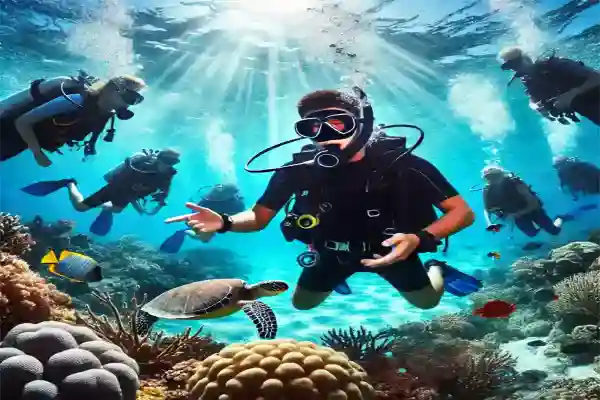The Path to Becoming a Dive Professional – Training, Daily Life & Reality
For many, working as a dive professional is a dream come true – living by the ocean, meeting people from all over the world, and exploring the underwater realm daily. But what does it really take to become a dive pro? What qualifications do you need? What is a typical workday like? And is it financially rewarding? Find out everything here!
1. Professional Dive Training
- From Beginner to Pro: The steps to becoming a Divemaster or Instructor
- Courses & Certifications: Open Water Diver ➝ Advanced ➝ Rescue ➝ EFR / First Aid Course ➝ Divemaster ➝ EFR / First Aid Instructor ➝ Instructor
- Specialty Courses in Divemaster Training: Navigation, Peak Performance Buoyancy, Nitrox, Wreck Diving, Night Diving and Deep Diving
2. Essential Equipment for Divemasters & Instructors
- Basic Gear (Mask, Snorkel): €100 – 300
- Wetsuit: €150 – 500
- Buoyancy Control Device (BCD): €400 – 800
- Regulator (1st & 2nd Stage with Octopus): €500 – 1,000
- Dive Computer: €300 – 1,000
- SMB (Surface Marker Buoy) & Spool: €50 – 150
- Fins (Open Heel with Boots or Full Foot Fins): €80 – 250
? Total Cost for a Professional Set: €1,500 – 3,500
3. A Typical Workday as a Dive Professional
Morning:
- Prepare the boat & set up guest equipment
- Briefing for the dive day & group assignments
- Check safety & select dive sites
During the Day:
- Lead dives & guide guests
- Assist divers & solve problems underwater
- Take photos & point out marine life
Evening:
- Unload the boat & clean equipment
- Refill tanks & prepare for the next day
- Organize guest lists & pick-up schedules
? Work Schedule: 7 days a week during the season, often 10-12 hours a day
4. Salary & Reality of Being a Dive Professional
- Divemasters: Often earn low wages, rely on tips
- Instructors: Higher earnings, but depend on Instructor level, dive center & location
-
Life in Paradise vs. Hard Work:
- Long hours, physically demanding
- Low salary, but ocean, sun & adventure, living the dream.
5. Professional Dive Levels – Why Training Never Stops
Becoming an instructor is not the final step. There are many further education opportunities:
Major Career Levels for Dive Professionals
- Divemaster (DM): Organizing and leading dives
- Emergency First Response Instructor (EFRI): Teaching first aid courses
- Open Water Scuba Instructor (OWSI): Certifying new divers
- Specialty Instructor: Additional qualifications in specialties (e.g., Wreck Diving, Nitrox, Sidemount, etc.)
- Master Scuba Diver Trainer (MSDT): Experienced instructors with multiple specialties
- IDC Staff Instructor: Assisting with instructor training
- Master Instructor (MI): Recognized for high-quality teaching
- Course Director (CD): Training new instructors
- Examiner / Instructor Trainer (IT): Evaluating new Instructors
6. Is It Worth Becoming a Dive Professional?
-
✅ Pros:
- Live in paradise
- Work with international guests
- Exciting, varied job with incredible marine life
-
❌ Challenges:
- Long working hours & low pay
- Physically demanding job
- Seasonal work & weather-dependent
7. Conclusion – Is a Career as a Dive Professional Right for You?
Being a dive professional is one of the most rewarding experiences, but it requires passion, dedication, and flexibility. Those who continue their education will have better job opportunities and can make their dream last long-term.
If you’re ready to take the first step, start your training now!
Learn more about professional dive training or sign up for your Divemaster or Instructor course now!

